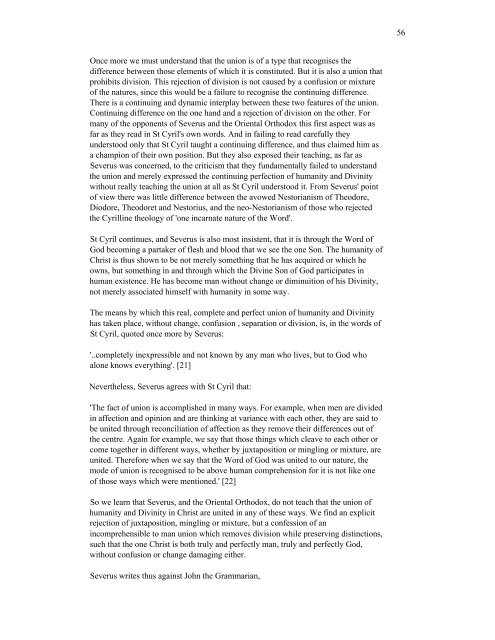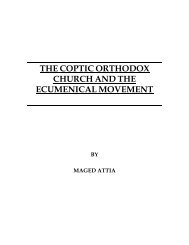Coptic interpretations of the Fourth Ecumenical Council - Saint Mina ...
Coptic interpretations of the Fourth Ecumenical Council - Saint Mina ...
Coptic interpretations of the Fourth Ecumenical Council - Saint Mina ...
Create successful ePaper yourself
Turn your PDF publications into a flip-book with our unique Google optimized e-Paper software.
Once more we must understand that <strong>the</strong> union is <strong>of</strong> a type that recognises <strong>the</strong><br />
difference between those elements <strong>of</strong> which it is constituted. But it is also a union that<br />
prohibits division. This rejection <strong>of</strong> division is not caused by a confusion or mixture<br />
<strong>of</strong> <strong>the</strong> natures, since this would be a failure to recognise <strong>the</strong> continuing difference.<br />
There is a continuing and dynamic interplay between <strong>the</strong>se two features <strong>of</strong> <strong>the</strong> union.<br />
Continuing difference on <strong>the</strong> one hand and a rejection <strong>of</strong> division on <strong>the</strong> o<strong>the</strong>r. For<br />
many <strong>of</strong> <strong>the</strong> opponents <strong>of</strong> Severus and <strong>the</strong> Oriental Orthodox this first aspect was as<br />
far as <strong>the</strong>y read in St Cyril's own words. And in failing to read carefully <strong>the</strong>y<br />
understood only that St Cyril taught a continuing difference, and thus claimed him as<br />
a champion <strong>of</strong> <strong>the</strong>ir own position. But <strong>the</strong>y also exposed <strong>the</strong>ir teaching, as far as<br />
Severus was concerned, to <strong>the</strong> criticism that <strong>the</strong>y fundamentally failed to understand<br />
<strong>the</strong> union and merely expressed <strong>the</strong> continuing perfection <strong>of</strong> humanity and Divinity<br />
without really teaching <strong>the</strong> union at all as St Cyril understood it. From Severus' point<br />
<strong>of</strong> view <strong>the</strong>re was little difference between <strong>the</strong> avowed Nestorianism <strong>of</strong> Theodore,<br />
Diodore, Theodoret and Nestorius, and <strong>the</strong> neo-Nestorianism <strong>of</strong> those who rejected<br />
<strong>the</strong> Cyrilline <strong>the</strong>ology <strong>of</strong> 'one incarnate nature <strong>of</strong> <strong>the</strong> Word'.<br />
St Cyril continues, and Severus is also most insistent, that it is through <strong>the</strong> Word <strong>of</strong><br />
God becoming a partaker <strong>of</strong> flesh and blood that we see <strong>the</strong> one Son. The humanity <strong>of</strong><br />
Christ is thus shown to be not merely something that he has acquired or which he<br />
owns, but something in and through which <strong>the</strong> Divine Son <strong>of</strong> God participates in<br />
human existence. He has become man without change or diminuition <strong>of</strong> his Divinity,<br />
not merely associated himself with humanity in some way.<br />
The means by which this real, complete and perfect union <strong>of</strong> humanity and Divinity<br />
has taken place, without change, confusion , separation or division, is, in <strong>the</strong> words <strong>of</strong><br />
St Cyril, quoted once more by Severus:<br />
'..completely inexpressible and not known by any man who lives, but to God who<br />
alone knows everything'. [21]<br />
Never<strong>the</strong>less, Severus agrees with St Cyril that:<br />
'The fact <strong>of</strong> union is accomplished in many ways. For example, when men are divided<br />
in affection and opinion and are thinking at variance with each o<strong>the</strong>r, <strong>the</strong>y are said to<br />
be united through reconciliation <strong>of</strong> affection as <strong>the</strong>y remove <strong>the</strong>ir differences out <strong>of</strong><br />
<strong>the</strong> centre. Again for example, we say that those things which cleave to each o<strong>the</strong>r or<br />
come toge<strong>the</strong>r in different ways, whe<strong>the</strong>r by juxtaposition or mingling or mixture, are<br />
united. Therefore when we say that <strong>the</strong> Word <strong>of</strong> God was united to our nature, <strong>the</strong><br />
mode <strong>of</strong> union is recognised to be above human comprehension for it is not like one<br />
<strong>of</strong> those ways which were mentioned.' [22]<br />
So we learn that Severus, and <strong>the</strong> Oriental Orthodox, do not teach that <strong>the</strong> union <strong>of</strong><br />
humanity and Divinity in Christ are united in any <strong>of</strong> <strong>the</strong>se ways. We find an explicit<br />
rejection <strong>of</strong> juxtaposition, mingling or mixture, but a confession <strong>of</strong> an<br />
incomprehensible to man union which removes division while preserving distinctions,<br />
such that <strong>the</strong> one Christ is both truly and perfectly man, truly and perfectly God,<br />
without confusion or change damaging ei<strong>the</strong>r.<br />
Severus writes thus against John <strong>the</strong> Grammarian,<br />
56








